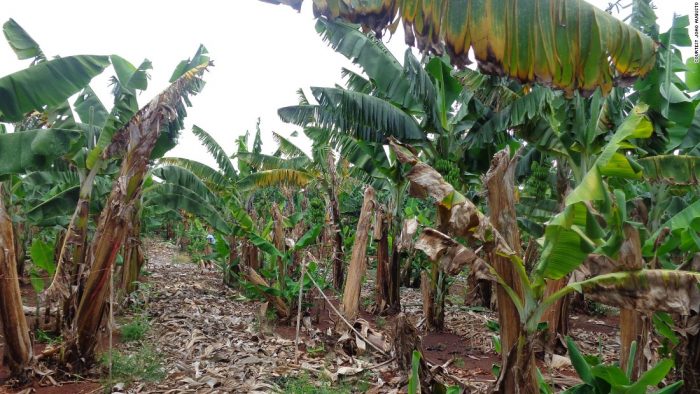Scientists in Rwanda have made a major breakthrough in fight against banana Panama Diseases through agricultural biotechnology by coming up with genetically modified banana varieties that are resistant to the deadly disease.
According to Athanase Nduwumuremyi, a senior scientist at the Rwanda Agriculture and Animal Resources Development Board (RAB) and coordinator of the Open Forum on Agricultural Biotechnology in Africa (OFAB) in Rwanda, adoption of genetically modified (GM) crops resistant to diseases holds promise in addressing food insecurity and malnutrition.
“There is a hopeful outlook regarding the potential use of GM crops now that parliament has passed legislation permitting their cultivation,” said Nduwumuremyi.
Genetic modification of crops entails the insertion of DNA into the organism’s genome, constituting a technological process.
Spreading in Southeast Asia in the past 10 years where it had been restricted, banana Panama Disease, a devastating wilting disease of bananas caused by a soil-inhabiting fungus species, has today reached other parts of the world including Africa.
In Rwand, it has been threating local varieties such as Kamaramasenge (a type of small sweet banana) Gisubi, Kayinja and Gros Michel bananas to extinction.
Nduwumuremyi says the disease remains incurable as it demonstrates resistance to all current fungicides. However, a local banana variety known as the East African Highland banana, exclusive to the Central East African region, has naturally acquired immunity.
Bill governing GMO crops
In December 2023, Rwanda passed a bill governing GMO crops.
Whereas conventional methods typically require over 10 years to develop new crop varieties, GMO biotechnology could accomplish this in just two years, said Nduwumuremyi.
Rwanda, under the guidance of Patrick Karangwa, the Director General of Agriculture Modernisation at the Ministry of Agriculture and Animal Resources, is in the process of completing a legal and regulatory framework for the safe utilization of genetically modified organisms (GMOs).
Additionally, members of the East African Legislative Assembly (EALA)’s Committee on Agriculture, Tourism, and Natural Resources have conducted oversight activities to evaluate policies and regulations concerning GMOs across the East African Community.
A survey conducted in Rwanda, Burundi, north-western Tanzania (including the Kagera and Kigoma regions), and eastern DR Congo (specifically South Kivu Province) aimed to assess the distribution and prevalence of Panama disease.
The findings revealed that the disease prevalence is notably elevated across the region, with 54.1 percent of all farms exhibiting an incidence rate exceeding 40 percent. Tanzania recorded the highest incidence rate at 63.6 percent.
Australia’s first genetically modified banana fruit
In May last year, Scientists at Australia’s Queensland University of Technology submitted Australia’s first genetically modified fruit – a Cavendish banana – to regulators for approval saying it is designed to help save the species.
The QCAV-4 banana if approved, it could be the first GM banana to be approved worldwide with potential safety net against the devastating Panama Disease.








